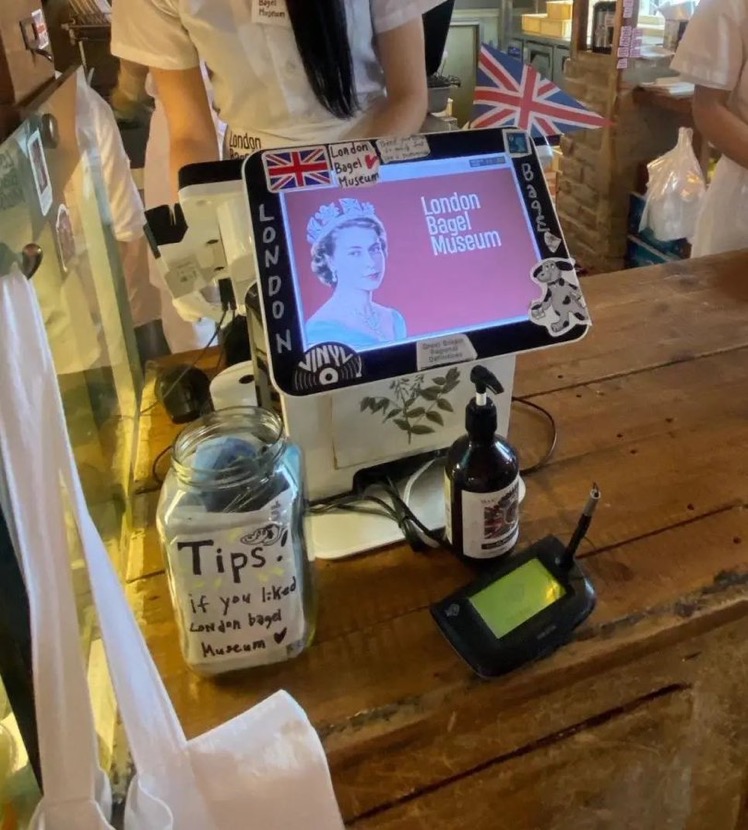In South Korea, a wave of controversy is sweeping across social media channels as some cafes and restaurants have begun soliciting tips or placing tip collection boxes near the cash register. The response from consumers has been largely negative, with many expressing the view that it is inappropriate given that the price already includes service costs in Korea. In addition, with resistance to the tip culture growing in the United States, locals are questioning why this practice should be implemented in Korea. While it is common overseas, it remains relatively unfamiliar to South Koreans.
Controversy over the tipping culture erupted in Korea when the Kakao Mobility Taxi Call Service, "Kakao T", introduced a trial tip for service option for passengers to use during the post-ride evaluation process. A tip payment window is displayed if passengers rate the service with the highest score of 5 points. Passengers are then given the option to choose between 1,000 won, 1,500 won, and 2,000 won as a tip for the driver’s service. When controversy arose over the tip service function, Kakao Mobility explained that whether or not consumers pay a tip is entirely voluntary. There are no additional fees, and the tips go directly to the driver. Since its introduction, an average of 1,900 passengers a day have responded positively to the driver's kindness through tips. Similarly, the Cafe London Bagel Museum, was marred in controversy after it placed a tip box in the shop for patrons to use if they wanted. When asked, representatives of the restaurant explained that it was part of their interior design concept to revive the atmosphere of the store, and said it was a voluntary contribution rather than a mandatory payment for services. However, data collected via the platform "Open Survey," revealed that 36.7% of 1,000 respondents expressed strong disapproval of a tip for service function. Customers feared this move would lead to expectations that consumers would be responsible for subsidizing a portion of the worker’s wages, a responsibility that is traditionally fully covered by employers. Others expressed it was an inconvenience, saying that service costs are already included in the price and that tipping will only increase the burden on consumers who are already dealing with rising food prices. Others pointed out that while it is up to consumers to pay tips, if they choose not to, it might result in the deterioration of service quality as staff feel insufficiently compensated.
 |
| ▲ Tip Box in Front of the Counter at London Bagel Museum (Photo from X) |
Amidst the inconvenience faced by customers and the growing backlash, there is a suggestion that tipping is actually a violation of certain well-established regulations in Korea. Clause 57 of the Enforcement Regulation of Food Hygiene states, ‘Restaurant businesses should specify the final price, including value-added tax and service charges, that customers should pay when it lists the price on the menu.’ Consequently, demanding tips in addition to the price indicated on the menu could be in violation of food hygiene regulations. However, it's essential to distinguish between actively compelling customers to leave tips and merely offering the option for them to express their appreciation through tipping. Many experts argue that establishments at the root of this controversy, including cafes and services like Kakao-T, do not force or disadvantage customers who choose not to contribute. They suggest tips are merely a voluntary gesture. However, if customers perceive the mere mention of tips as a form of coercion this can intimidate customers and make them uncomfortable. However, banning the suggestion of tips was not the intent of the law. The regulation was adopted to prevent businesses from compelling customers to pay prices beyond what was stated on the menu. It does not cover voluntary contributions. Tipping also raises concerns about tax evasion. According to clause 38 of the constitution in Korea, employees are obliged by law to pay taxes on earned income. Failing to report the additional untraceable revenue for tax purposes violates constitutional law.
The Dankook Herald asked Professor Shim Gyeong-bo of the Dept. of Economics at Dankook University, to address our questions about the tipping culture controversy. He said that because people leave tips for many reasons, it is important to judge the concept from multiple perspectives. Firstly, he pointed out that tipping is a reward for exceptional service. Secondly, he viewed it is a kind of social practice, encompassing customary and cultural aspects. Lastly, he said there is a psychological perspective. Consumers often leave tips due to concerns that their gratuities can make an impact on the livelihoods of service employees. Accordingly, he assessed that if the tipping culture is primarily interpreted from the perspective of economic efficiency, it is likely to have a positive effect by providing a means for compensating workers for their services, while tipping for social customs and psychological reasons may sometimes have unintended negative consequences, as it can feel more obligatory than voluntary. Furthermore, he anticipated that if the tipping culture were to spread across Korea in the future it would likely yield limited positive effects if it were to remain a voluntary practice. In fact, he predicted the limited positive effects might even gradually diminish over time as the benefits begin to outweigh the increased welfare of service employees. Overall Professor Shim thinks it is unlikely that a tipping culture would emerge any time soon in Korea due to the prevailing antipathy toward the practice amongst consumers. To settle the controversy, social consensus is necessary, but this is seemingly more difficult to achieve as negative perceptions towards the practice have spread even in the United States, where the tipping culture has long been entrenched.
 |
| ▲ Kakao T Suggesting Tips (Photo from Chosunilbo) |
Once prices and the cost of services are increased, they can’t easily be reversed. As such, there is a growing concern that tipping may also become a permanent fixture within pricing structures. To Korean consumers unfamiliar with the practice, there is still emotional resistance towards tipping for service, regardless of its legality. It may require a careful determination of whether the tipping culture that emerged in the United States, for workers who were not always guaranteed a minimum wage, is suitable for South Korea, where the minimum wage is legally defined and universally applied.
배서연, 정영훈, 이은희, 윤희원 dankookherald@gmail.com

 Vote for the Campus Brand Naming!
Vote for the Campus Brand Naming!

![[Campus Magnifier] Let's Surf the Library!](/news/thumbnail/202404/12496_1765_4143_v150.jpg)




